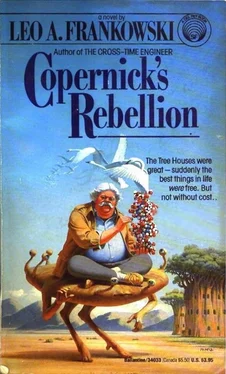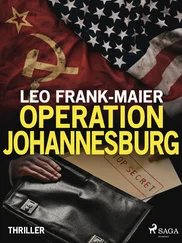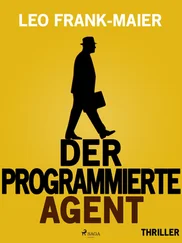There was a three-second delay.
Dirk here. Permission granted. The luck you’ve had. You’re out of action for a month losing your bird, and now, thirty minutes after getting to your duty station, you’re coming back again.
Claymore here. Those are the breaks.
Dirk here. Well, if you’re still punning, you can’t be too bad off. I’ll tell Ishtar you’re coming. Dirk out.
Others were not as bad off. The farmers lost their machinery and most of their houses, but they were traditionally self-reliant. In the northern hemisphere, the crops were ready for harvest. For the first time in many years, there was a surplus of eager, if unskilled, labor.
In general, the less technically advanced were the least affected. The few remaining Eskimos were annoyed when their outboard motors, snowmobiles, and rifles were eaten, but the old ones knew how to do without such things. They taught the younger men, and gained considerable prestige and security.
Except for Hawaii and other islands with military bases, the Pacific was not plagued with the metal-eating larvae. On the Marshall out-islands, the people listened to their radios with detached interest. The troubles of the outside world provided a useful source of gossip, nothing more. Little had ever been done to them, and less for them. Bare-breasted native girls danced, laughing, at the usual ceremonies.
Throughout the underdeveloped world, crowded masses trudged on in despair, as they had done for a hundred years. Yet, in many, there was a glow of hope. They had been promised enough food for all. If that was true, it was indeed a blessing, because no one could remember a time when there had been enough for everyone.
In the American west, many American Indians were happy. Organized, intelligent, and poor, but with plenty of land, they had wholeheartedly accepted the tree houses as soon as the seeds had become available. Over half the American Indian population already lived in tree houses, so the larvae did not cause them extreme inconveniences.
The old chiefs, the wise men, the men of power were smugly contented. As they had so often predicted, the insanities of the white man had finally caught up with him. They had even heard one of them admit as much on the radio, and in their own language. Before the radios went silent, the old ways would return, and perhaps even the buffalo.
The young men were not content, but eager. They remembered the old stories, and told them to each other. The time of defeat and drudgery and shame was over. There would again be a time when skill and courage and honor counted.
Russia went the way of Europe and North America, with a breakdown of communications and central authority. From her crumbling cities came the long lines of refugees. Her countryside, too, was in a difficult position, as the workers on the large collective farms did not have the tradition of self-reliance that kept farmers in other parts of the world relatively unaffected.
China was in relatively good shape. The large population was dispersed, and not far from food supplies. In sixty years the farms had only been lightly mechanized; that work was wasted, but survival was not a serious problem.
Japan’s problems were most serious. Tree houses had never really caught on there, and most of its food had been brought to her ports on ships that were no more. The Japanese could only hope that the voice on the radio had told the truth.
From Life Valley, one million LDUs, their language lessons completed, trotted toward their assigned areas. Each was to watch over the safety of ten thousand humans, and they had doubts as to the possibility of doing the job well.
Each platoon of one hundred had with it two Betas with their observation birds and one mind-reading Gamma unit. The birds were important to locate tree houses. All of the recent models had an external spigot that gave out the food that the LDUs ate. They would need to find many of these on the trek ahead.
Chapter Ten
JULY 22, 2003
I HAVE enlarged my memory banks in order to better accommodate the influx of data on the increasing number of humans entering the valley.
In future daily reports on each human, you must prefix each notation with the code number which I have assigned to that human. Because of the prejudices of the humans, it is imperative that no human learns his own number, or even that such numbers exist.
These records will be useful in making long-term prognoses; the data will will not be available to humans because of our “right to privacy” directive.
—Central Coordination Unit to all local ganglia
Hastings remembered how a month ago he had awakened hot on the desert sand. He had lain there for minutes, trying to figure out where he was and why he was there. His last memories had been of relaxing in the F-38, mentally preparing himself to drop his first atomic bomb.
What did they hit me with? he thought.
Cautiously he moved the various parts of his body. Nothing broken. He got up and stripped off his suit and parachute. He found the standard-issue survival pack. Food. A .22-caliber handgun. Compass and maps. A canteen of distilled water. A manual. A radio that didn’t work.
He drank deeply, knowing that rationing the water was a bad idea. Better to drink now and get the full cooling benefit of the water. He rigged the parachute into a sunshade and waited for Air Rescue for a day and a half. It didn’t get there. He made an arrow with rocks to show his direction of travel.
The next evening, at moonrise, he picked up his belongings and started walking southwest, toward Death Valley.
“Who was it that said that the only way to stop a good man is to kill him?” he said to the rocks. “Funny, I can’t remember.”
He walked until sunrise without seeing any sign of man, not even a plane. He found the shelter of an overhanging rock and survived the day. At moonrise, he finished his water and walked on. The only sign of life was a shiny mosquito that seemed to be in love with his belt buckle.
The next morning his urine looked like Bock beer and he started to worry.
He woke to find a larva eating a hole in the barrel of his pistol. He tried to scream, but his throat was too dry to make a sound. He struggled to his feet, staggered a hundred yards, and fell down. He knew then that he was a dead man. He rolled over, put himself in a dignified posture, and prepared his mind for death.
He woke to find a gourd of water being held to his mouth by a powerful tan hand. He gulped the water.
“Slowly at first, sir.”
Something was strange about the wrist. Yes, there was a slot in it. He jerked himself upright, spilling some of the water.
“You’re one of them!” Hastings croaked.
“I suppose so, sir.” The LDU rescued the water gourd. “I’m Labor and Defense Unit Alpha 362729. My friends call me K’kingee.”
Hastings took another drink of water.
“What makes you think that I’m your friend?”
“I presumed that you would feel a certain amount of gratitude, sir.”
“I guess I do. Thank you. Am I a prisoner of war?”
“You are not a prisoner of anything, sir.”
“Are you going to kill me?”
“Had I intended that, it would have been more efficient to have simply let you die.”
“Don’t you realize what I am?”
“You are a human being, sir.”
“I mean the uniform.”
“Your clothing indicates that you were a general officer in the United States Air Force.”
“What do you mean ‘were’?”
“The Air Force no longer exists, sir. At least it no longer has aircraft capable of flight.”
“How did you manage that?”
“I didn’t manage it, sir. Didn’t you notice the larva that is eating your pistol?”
Читать дальше











